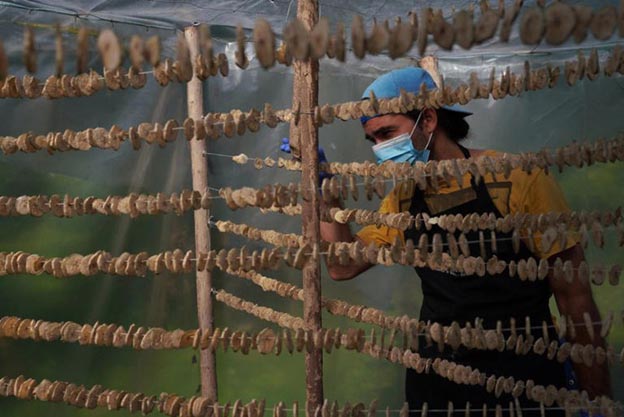Cuba, like Guyana, has a reputation for turning to creativity, particularly in its agricultural and agro-processing sectors to respond to economic challenges that place restrictions on foreign food imports. A November 22 Reuters story on how Cuban families press agricultural produce into marketable agro produce point unerringly to the axiom that old habits die hard.
The Reuters story, headlined ‘Cuban family business produces flour from coconut and yucca as shortages fester’ describes how Cubans are sticking to their guns insofar pressing fruits and vegetables into service to produce other consumer goods.
Among the stories of Cuban creativity and self-reliance in its food production pursuits are those of 38 year-old entrepreneur, Gabriel Perez whose dried banana slices produced on the rural outskirts of the country’s Capital produces gluten-free flour. Banana, however, is not the only agricultural product that is pressed into service to produce flour. Coconut and Yucca are no less effective in creating locally-sourced substitutes for high-priced imports that are beyond the means of many Cubans.
Stories of this nature have their origins in some of the fallout from the wider story of the Cuban revolution and its aftermath, including the attendant political and economic ‘squeeze’ placed on the Caribbean island by the United States. Cubans embraced their preference for local ingredients to what the Reuters story describes as “pricey imports” in pursuit of innovative solutions to the protracted food crisis that it has had to endure.
According to the Reuters story Once COVID-19 had ‘ganged up’ with “stiff US sanctions and floundering tourism” to place the Cuban economy in decidedly choppy waters, Cubans, thereafter, had little option to embrace initiatives that combined to creative a survival mode.
Nor is Perez alone is what can be described as a demanding self-reliance journey. Sixty four year-old Maria Perez Corralles has also embraced the dried banana option for producing flour. She operates on farmland on the Rural outskirts of Havana, the Reuters report says.
Perez, whom the Reuters says “recently sold a home and business to settle on farmland in the rural outskirts of Havana is quoted in the Reuters story as saying that Cuba’s challenges “stem in part from a lack of culture around eating the foods that we have at hand.” He points to Cubans’ reported “preference for rice, pork and beans, which, while locally available all locally available “require machinery and agricultural inputs to grow at scale, the Reuters report says.
According to the Reuters story, Perez’s business, named Bacoretto “dries and mills yucca, rice, banana and coconut into organic flour preferred by gluten-intolerant consumers, who have only recently been able to find food products tailored to their dietary needs in Cuba.” The news agency quotes Perez as saying that “byproducts of their processes are used to make coconut oil, coconut-fiber rope, vinegar and fermented products and sweets.”
The Reuters quotes Perez as saying that Bacoretto took advantage of a 2021 decision to lift a ban on private companies in place on the island since shortly after Fidel Castro’s 1959 revolution.”




